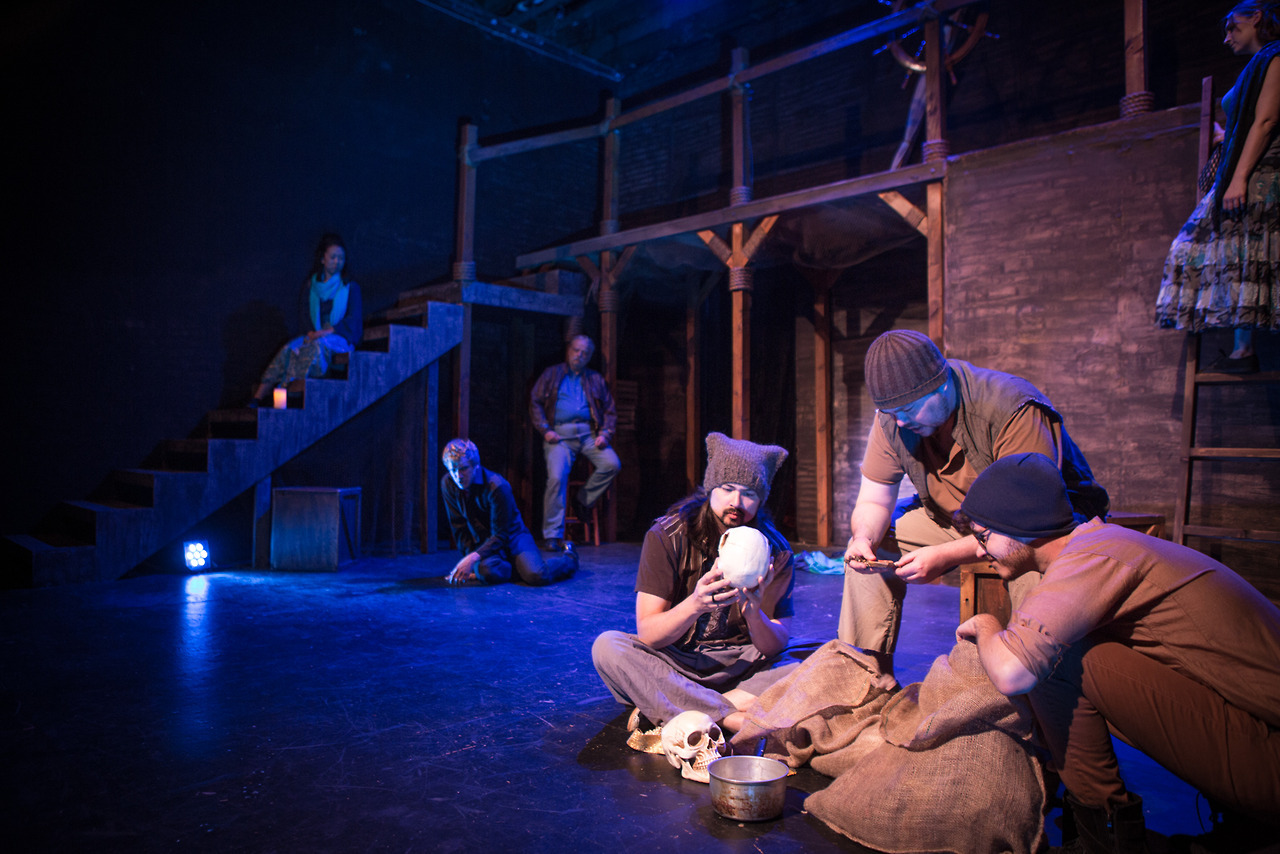“Charles Pasternak directs the hell out of the play by staging the moments as colorful micro-pageantry – “Look at this,” the show shouts and teases. “Look at what’s happening here. I dare you not to say ‘Holy shit.’”... Pasternak uses his cast as a fluid, defining and moving the action in pleasant stage picture after dynamic stage picture after surprising stage picture.”
Valley Theatre Award Nomination: BEST DIRECTOR for Pericles
The Fishermen and Pericles
Jono Eiland, Thomas Bigley, & Will Block as the Fishermen; photo by Zachary Andrews
“Director Charles Pasternak imbued the production with a sense of the comedic without sacrificing structure. By switching gender for some of the cast, it lends the production a bit of the absurd, which works brilliantly.”
Mother and Son
Jesse James Thomas as Cloten & Thomas Bigley as the Queen in Cymbeline; photo by Mandi Moss
Broadway World Nomination: BEST DIRECTOR for Cymbeline
“The performances are absolutely spectacular… I particularly appreciated the gender-bent casting. The king is female and the revolting queen a man. Most of the roles were cast as female in fact, which is a lovely twist on what was when first this was performed.”
“Director Charles Pasternak has created an over-the-top world in which these people even move in choreographed patterns as they dance in and out of Timon’s presence to humbly receive his gifts... the overall world created is a perfect commentary on the materialistic society in which we live... Pasternak did a masterful job of casting and creating two starkly different worlds that each holds their own definition of truth.”
Timon Distributing his Wealth
photo by Rob Cunliffe
“‘How this lord is followed!’ exclaims a Painter in reference to Timon of Athens early in Act I of the play that bears his name. Director Charles Pasternak interprets the line quite literally by having his throng of greedy hangers-on trail behind Timon as he moves about the stage, billowing en masse like a bridal gown’s train that sweeps and glides with every turn. The repetition of the exaggerated movement comically drives home its ridiculousness and leaves no doubt that in this Shakespeare play, the fools are everywhere.”
“Pasternak’s interpretation reflects on the eventual outcome of the war in a way that Shakespeare didn’t, but it’s not as if he’s giving away the surprise ending — surely anyone who sees this production knows how the war ends. The ending imparts a gravitas that’s missing from Shakespeare’s ending, and it also leaves this phrase in our minds as we leave — “the chance of war”. That’s an apt farewell, for the play is a vision of war as an arena in which valiant principles are sacrificed at the altar of pragmatism — and chance.”
“Director Charles Pasternak has edited this multifarious play — the third longest in the canon — to just over 2 1/2 hours without losing narrative focus, a feat in itself. As is his wont, Pasternak uses the various levels of the Whitmore-Lindley Theatre Center to smart effect, starting with a riveting tableau vivant prologue led by Helen (Eliza Kiss), she of the thousand-ships-launching face.”
“Director Charles Pasternak’s use of the entire cast as occasional chorus is quite effective. His staging, which frequently involves using the ensemble to create intriguing visual moments, is even better — for example, he positions the subjects of the starving Tarsus at the feet of their hopeless king in a sort of sculpture of despair. He also creates a subtle effect many times throughout by having a character — who is either dead or not physically supposed to be there — silently watching the proceedings, their symbolic presence made manifest.”
“Director Charles Pasternak creates a powerful, passionate production always on the move and prowl. His creative, almost steampunk staging contains visceral might in its choreography.”
“Henry V is infused with infectious brio by director Charles Pasternak... it soars on consistently high-quality performances, and Pasternak’s imaginative marshaling of his large cast and clever use of limited performance space.”
The Chorus L
eading the Company
Leon Russom as the Chorus; photo by Rob Cunliffe
“Director Pasternak’s muscular scene work and arresting stage compositions - along with his knack for making virtues of virtually zero production values - translates into a refreshing lack of formal airs and a translucency of language charged with an unflagging energy.”
“...an impressive coup involving multiple successful functions: Director Charles Pasternak’s attention to stage picture through light and movement... the director’s work with the other actors is exemplary.”
“Pasternak’s ever imaginative direction emphasizes the Merry Wives’ ample slapstick elements... Overall, there are no weak links in Pasternak’s quite competent cast.”
Scenie Award for Outstanding Direction of a Shakespeare Play: Charles Pasternak - The Merry Wives of Windsor
The Merry Wives
photo by Greg Eident
“Director Charles Pasternak finds admirable pleasures in moving his large cast around the multi-level space, including ukelele-accompanied group sings framing each act.”
Ulysses Leaving Troy
Thomas Bigley as Ulysses in Troilus and Cressida; photo by Rob Cunliffe
“Pasternak’s direction is spot-on, and laughs are due as much to the cast’s razor-sharp line delivery as to Stoppard’s witty, albeit wordy, dialog.”





